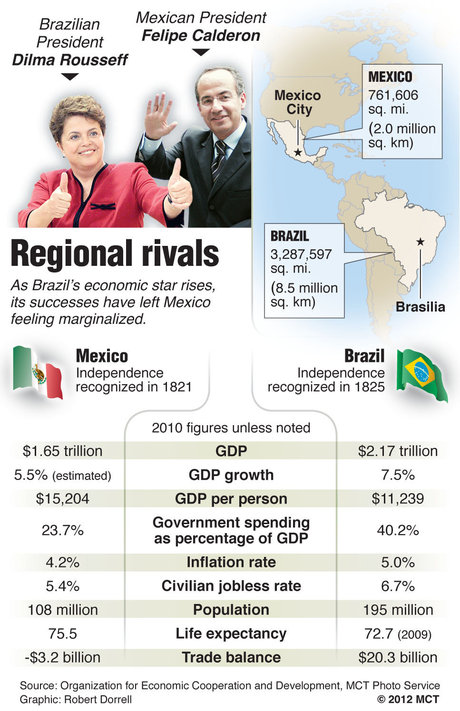In a spate of self-reflection engendered by election season, Mexicos politicians are repeatedly taking public measure of their nation against Brazil, a perennial rival in Latin America, and finding themselves coming up short.
“They are moving so fast ahead that we don’t even see the dust from behind,” former President Vicente Fox told a group of foreign correspondents last week.
The two most populous nations of Latin America have long jockeyed for hemispheric clout. Both are global diplomatic players, beacons of culture and regional economic engines, from samba, soccer and aircraft production in Brazil to margaritas, Mayan ruins and automotive plants in Mexico.
Yet as Brazil claimed the United Kingdom’s spot this year as the world’s sixth largest economy, its sustained economic rise has left Mexicans – whose country has the world’s 13th largest – feeling marginalized.
In a two-hour debate Sunday, four presidential candidates who are competing in the July 1 presidential election brought up comparisons to Brazil to illustrate how Mexico lags.
Gabriel Quadri de la Torre, an ecologist who’s running for the New Alliance Party, called for the national oil company, Petroleos de Mexico, to open up to foreign investment as Brazil’s semipublic company, Petrobras, has successfully done. He also asserted that Brazil graduates “two or three times” more physicians in relation to its population than Mexico does.
Read more here: http://www.mcclatchydc.com/2012/05/08/148252/mexico-looks-at-rival-brazil-and.html#storylink=cpy

The distant front-runner in pre-election polls, Enrique Pena Nieto of the Institutional Revolutionary Party, flayed President Felipe Calderon for presiding over lackluster economic growth.
“We are the country in Latin America that grows the least, and other countries – like Brazil, like Colombia, like Peru – have grown two or three times the rate of Mexico,” Pena Nieto said.
Mexico’s pessimism is partly due to an economic slump and public security woes that monopolize headlines. But scholars say Mexico’s angst may be more of a subject for a psychoanalyst’s couch than a cold look at comparative situations.
While Mexico’s mayhem from organized crime shapes perceptions, Brazil’s homicide rate is higher. In a study released in October, the Vienna-based United Nations Office on Drugs and Crime put Brazil’s homicide rate at 22.7 per 100,000 people, well above Mexico’s rate of 18.1.
Further, Mexico’s economy, dragged down by the U.S. recession, is forecast to grow at 3.8 percent this year, similar to Brazil’s projected growth.
“There’s always been a rivalry, and there’s always been a certain amount of jealousy,” said Andres Rozental, a former Mexican deputy foreign minister.
Brazil looks forward to showcasing itself as the host of the 2014 World Cup in soccer and the 2016 Summer Olympics. Brazilian tourists, their wallets filled with a strong currency, crowd foreign airports.
In the shorthand for its clout, Brazil is the leadoff member of the BRIC countries – Brazil, Russia, India and China – deemed to symbolize the shift in global power from established developed economies.
While not always successful, Brazil’s diplomats have sought a voice in matters as far afield as the Iranian nuclear crisis and the fate of Palestinians.
“For now, Brazil surely has more weight and influence in global affairs,” said Michael Shifter, the president of the Inter-American Dialogue, a research center in Washington.
Mexico thrives in different arenas. In June, it will host a meeting of the G-20, which will bring President Barack Obama and other heads of state of the world’s largest economies. Last year, envoys from some 190 nations met in Cancun for a global summit on climate change.
Mexico has forged free-trade agreements with at least 32 countries – it claims more than any other country in the world – and presses for entry into the Trans-Pacific Partnership, a pact among the world’s fastest-growing economies.
Brazil also has a faced a setback in a major diplomatic quest.
“Brazil’s foreign policy has one overriding objective: a permanent seat on the Security Council. So far, it hasn’t gone anywhere,” Rozental said, referring to the U.N. panel.
That hasn’t put a damper on Mexican handwringing.
“They feel insignificant for some reason historically, ‘We poor little Mexicans,’ ” said Riordan Roett, a scholar on the region at Johns Hopkins University’s School of Advanced International Studies. “The Brazilians never feel like ‘poor little Brazilians.’ ”
It wasn’t so long ago that Mexico played an outsized role in hemispheric hot spots, leading the Contadora group of Latin nations that sought peace during the Central American civil wars of the 1980s and mediating between the United States and Cuba.
In many ways, Brazil and Mexico have similarities as striking as their differences. They both suffer poor infrastructure, neglected schools and deep pockets of inequality. While Brazil enjoys strong tail winds now from commodity sales to China, Mexico had its boom in the 1990s.
If Mexico can overcome challenges with organized crime and undertake significant political reforms, it will make major strides, some experts forecast.
“I just don’t see it as the perpetual pessimistic story that some people do,” said Shannon K. O’Neil, a senior fellow for Latin American studies at the Council on Foreign Relations in New York.
Jim O’Neill, Goldman Sachs’ chairman of asset management – and the analyst who coined the BRIC acronym – predicted recently that Mexico would become the seventh biggest economy by 2020.
Rozental, the former Mexican diplomat, concurred that the country has brighter days ahead.
“Mexico’s economy will again be larger than Brazil’s,” he said, adding, perhaps wishfully, “Brazil is going to stagnate” because of its protectionist trade policies and reliance on commodity exports.

Email: tjohnson@mcclatchydc.com; Twitter: @timjohnson4
Read more here: http://www.mcclatchydc.com/2012/05/08/148252/mexico-looks-at-rival-brazil-and.html#storylink=cpy